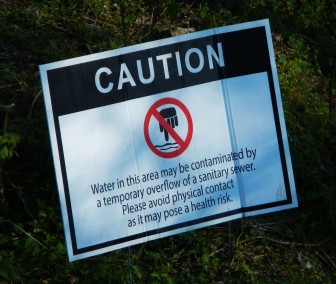Conservation Groups Push For Faster Alerts on Sewage Spills
As the Black Warrior Riverkeeper, Nelson Brooke keeps a record of all known sewage spills in his watershed. “See all these SSO notifications? That’s just this week,” he says, as he goes through his email.
SSO’s are Sewage Spill Overflows from public or private sewer operators. In 2016, Alabama conservation groups found that the state had more than 1,200 reported SSO’s that year. One spill can release up to hundreds of thousands of gallons of raw sewage. According to Brooke, people out swimming or fishing in state waterways might not know when that water is contaminated.
Current law says sewer operators must report any leak to state regulators within 24 hours. If the spill could endanger human health, they also must notify the public. Brooke says this language is problematic. “It’s worded in a fairly vague way, that’s not effectively enforceable,” he says. Brooke argues that people recreating in the water are not notified on time, if at all. “So basically what we have is some operators notifying ADEM within 24 hours, a lot of them still not even accomplishing that, not being held accountable for that by ADEM, not being fined.”
A spokeswoman for ADEM, the Alabama Department of Environmental Management, declined an interview, but said in an email the agency addresses noncompliance, though consequences range from a warning phone call to litigation.
A Petition for Change
Last year, nine water conservation groups petitioned the agency that oversees ADEM to change the requirements for public notification. Specifically they sought to require operators notify ADEM of a spill within 12 hours rather than 24, offer opt-in email and phone alerts for the public, and require signs be posted about the contamination. The petition was denied. ADEM described the requests as “logistically burdensome and resource intensive.” However, the agency did start an opt-in email notification system for residents last year.
For residents like Ayanna Anderson, email alerts about water contamination may not be of all that much use. “No I’m old fashioned. I don’t fool with email, Gmail, none of the above,” Anderson says. On a recent afternoon, she and her family spent the day fishing along Valley Creek in Bessemer. Their fishing hole is downstream of a frequent overspill site, and Anderson says she wants physical notification when there could be sewage contamination, explaining, “A big ole’ sign right here when I get out my car. Warning! Danger!”
Reaching the Public
The director of environmental services for Jefferson County, David Denard, says it can be a complicated task to post signs at local recreation sites when there is potential contamination. “It’s a challenge when you have a 3,500 mile system,” Denard says. “Our staff can’t always know every neighborhood and it’s really a challenge in knowing where to get those notifications and put those signs out.”
When a significant spill threatens local waterways, Denard stresses that the county notifies ADEM and local media. Yet, he also says some overflows have no impact on the public, like when a cracked pipe releases barely any sewage. In these cases, Denard says too much notification can backfire. “You’re going to overwhelm the public with information,” he says,”and when you really need to get the notification out, you want (to) get the attention you need.”
According to Denard, Jefferson County has reduced the number of sewage spills by more than half in recent years. Though, when there is a spill, conservation groups stress that people need to know about it before potentially recreating in contaminated water.
New York Giants hire John Harbaugh as coach after identifying him as their top choice
Harbaugh joins the Giants 11 days after he was fired by the Baltimore Ravens. The Super Bowl champion is now tasked with turning around a beleaguered franchise.
US launches new retaliatory strike in Syria, killing leader tied to deadly Islamic State ambush
A third round of retaliatory strikes by the U.S. in Syria has resulted in the death of an Al-Qaeda-affiliated leader, said U.S. Central Command.
NASA rolls out Artemis II craft ahead of crewed lunar orbit
Mission Artemis plans to send Americans to the moon for the first time since the Nixon administration.
Trump says 8 EU countries to be charged 10% tariff for opposing US control of Greenland
In a post on social media, Trump said a 10% tariff will take effect on Feb. 1, and will climb to 25% on June 1 if a deal is not in place for the United States to purchase Greenland.
‘Not for sale’: massive protest in Copenhagen against Trump’s desire to acquire Greenland
Thousands of people rallied in Copenhagen to push back on President Trump's rhetoric that the U.S. should acquire Greenland.
Uganda’s longtime leader declared winner in disputed vote
Museveni claims victory in Uganda's contested election as opposition leader Bobi Wine goes into hiding amid chaos, violence and accusations of fraud.






